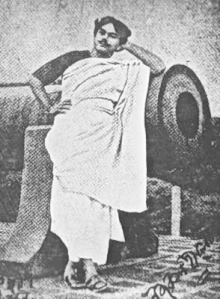Bidrohi (poem)
"Bidrohi" (Bengali: "বিদ্রোহী", English: "The Rebel") is a popular revolutionary Bengali poem and the most famous poem written by Kazi Nazrul Islam in December 1921.[1][2][3] Originally published in several periodicals, the poem was first collected in 1922 in a volume titled Agnibeena: the first anthology of Nazrul's poems. Many has seen, in this poem, elements of romanticism, heroism, and love.[4][5][6] This poem, through which Nazrul celebrated human creative powers, asserted his affirmation of the individual human capacity for heroic action and human unity and solemnly called for rebellion against all forms of oppression (including that of the British in India) elevated him to the status of a national figure.[7] Syed Ali Ahsan wrote that the poem was inspired by Walt Whitman's "Song of Myself".[8]

Few lines from Bidrohi
I am the unutterable grief,
I am the trembling first touch of the virgin,
I am the throbbing ten,
I am the wild fire of the woods,
I am Hell's mad terrific sea of wrath!
I ride on the wings of lightning with joy and profundity,
I scatter misery and fear all around,
I bring earth-quakes on this world! “(8th stanza)”Last stanza
Weary of struggles, I, the great rebel,
Shall rest in quiet only when I find
The sky and the air free of the piteous groans of the oppressed.
Only when the battle fields are cleared of jingling bloody sabres
Shall I, weary of struggles, rest in quiet,
I am the rebel eternal,
I raise my head beyond this world and ,High, ever erect and alone! “(Last stanza)”[9] (English translation by Kabir Choudhary)
References
- "Vignettes of brilliance". 2012-05-24. Retrieved 2016-06-25.
- Huda, Mohammad Nurul (1986). Flaming Flower: Poets' Response to the Emergence of Bangladesh (1st ed.). Dhaka: Bangla Academy. p. 189.
- "A tribute to Bengal's rebel and revolution". Retrieved 2016-06-25.
- Langley, Winston E. (2009). "The spirit of rebellion and creation". Kazi Nazrul Islam The Voice of Poetry and the Struggle for Human Wholeness. Dhaka: Nazrul Institute. p. 41. ISBN 984-555-384-2. OCLC 173249071.
- Gowswami, Karunamaya (1989). Kazi Nazrul Islam: A Profile. Dhaka: Nazrul Institute. p. 6.
- Chowdhury, Kabir (1997). "Kazi Nazrul Islam: His Revolt and Love". In Mohammad N. Huda (ed.). Nazrul: An Evaluation. Dhaka: Nazrul Institute. p. 87.
- Langley, Winston E. (2009). "Introduction". Kazi Nazrul Islam The Voice of Poetry and the Struggle for Human Wholeness. Dhaka: Nazrul Institute. p. 12. ISBN 984-555-384-2.
- Ahsan, Syed Ali (1987). "English text: Preface". Walt Whitmaner Nirbachita Kabita : A bilingual collection of selected poems by Walt Whitman (in Bengali and English) (2nd ed.). Dhaka: Bangla Academy. p. 71.
- Kabir, Choudhary. "Rebel". Retrieved 2006-07-08.